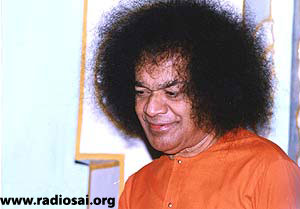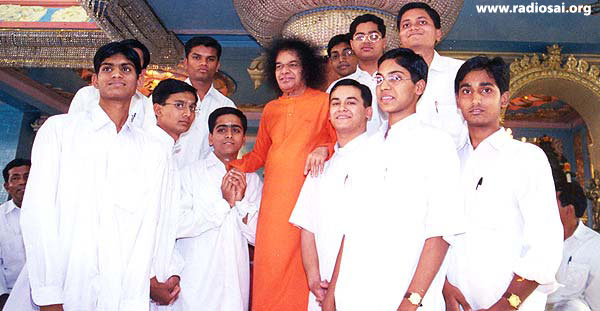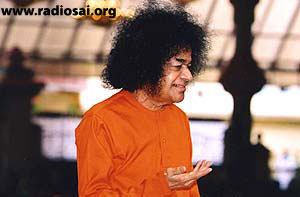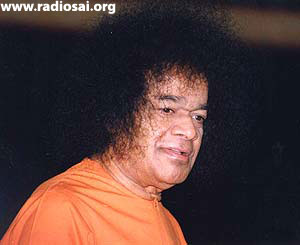 |
 |
 |
Volume
6 - Issue 12
DECEMBER - 2008 |
CONVERSATIONS WITH SAI
CHAPTER 4 - THE OUTER DOOR Prof. Anil Kumar: Bhagavan! Should we follow any discipline or regulation in our food habits? Is that necessary for our spiritual pursuit? Sai devotees all over the world are vegetarians because of Your teachings; this is amazing. However, we have none today to tell us matters relating to our food habits. Kindly direct us. Bhagavan: As is the food, so is the mind. As is the mind, so are our thoughts. As is the thought, so is the action. As is the action, so is the result. Therefore, the result depends on the food you eat. Meticulously and unerringly, you should follow discipline in your food habits. Food, Head, and God are to be viewed in this sequence. As is your food, so is your head; as is the condition of your head, so is the manifestation of God in you.
You should not eat too much. You eat to live and never live to eat. Eating in excess is a tamasika quality. If you eat once a day, you are a yogi; if you eat twice a day you are a rogi (sick). If you take sattvika, soft, and balanced food in moderate quantity, you develop sattvika or a pious mind. However, if you eat rajasika, spicy, hot food you will have rajasika or an emotionally agitated mind, and if you have tamasika food, that is meat, alcohol, and so on, you will have tamasika or a bestial, dull, and passive mind. So, it is food that shapes the mind, and on this your actions depend, leading to their corresponding consequences. You should also think of patrasuddhi, the cleanliness of the vessels and utensils used; padarthasuddhi, purity of the materials; pakasuddhi, clean method of preparation or cooking; and bhavasuddhi, purity of the thought of the person who cooks the food. You shouldn't eat food offered to you everywhere. A few years ago, there lived a sanyasi (ascetic) who on invitation dined at the residence of a businessman. That night this sanyasi, a celibate and spiritual seeker, could not sleep. Somehow, he fell asleep very late, and had a dream in which he saw a sixteen-year-old girl shedding tears. Then, this sanyasi went to his guru and told him about the dream. The guru meditated for some time and told him the reason behind the dream. The day on which the businessman invited him for dinner happened to be the eleventh day after the death of his sixteen-year-old wife and he was performing the traditional special rites. Since the sanyasi ate the food cooked for the occasion, the girl who had died appeared in the dream with tears in her eyes. The young girl's father was very poor and could hardly maintain his family. So, much against her wish, he gave her in marriage to this aged businessman. Out of frustration, she committed suicide by jumping into a well. The businessman had been performing her customary funeral rites and on the eleventh day requested the sanyasi to come over to his house for meals. This is the whole story behind the sanyasi's dream. Hence, without discrimination, you shouldn't eat any food offered to you.
A similar thing happened once to a disciple of Swami Nityananda. One day, he went out of the ashram and ate food outside. While returning, he stole from a house a silver tumbler and brought it to the ashram. But soon, he felt very sad over this action of his. He cried and repented. The next morning, he went to his guru and confessed the whole incident. Because of his spiritual power, Nityananda could find out the reason. He said to his disciple, "Well, the food you had outside the ashram was prepared by a cook who at one time happened to be a thief, and as a result you developed the instinct to steal." Therefore, cooks must have purity of thought. Further, you should feel your body as light after eating, as before eating. The best thing is to keep half of your stomach empty. The remaining half should be filled in with water and other foodstuffs. Tubers are not good for the body. You should not drink whole milk. You should mix some water in your milk before drinking. You should have a minimum interval of four hours between two meals. You should take food, which gives you enough calories needed for the body. You shouldn't have too much of oily and fried curries. Sleep a while after lunch, and walk a mile after dinner. You should work hard and eat well. Prof. Anil Kumar: Swami! In Your organization or your institutions, workers, students, teachers, devotees and doctors wear the white dress always. Why? What is the reason? Bhagavan: White symbolizes purity and cleanliness. A pure white cloth may be compared to a clean mirror. If dust gathers on the mirror, you will not be able to see your reflection clearly. Similarly, buddhi or intellect is like a clean white cloth. It is only then that you will be able to find out your own faults and apply your discrimination to rectify them. Today, this does not happen. People are able to see clearly the mistakes of others but don't find their own faults. If you stand in front of a mirror, you see your reflection. But, if you turn it towards another man, naturally you will find his reflection. Isn't it so? Similarly, the mirror of your buddhi or intellect is turned towards others, and this makes you see the mistakes of others.
Even the slightest spot or mark is very clearly visible on a white dress. If you wear a colored dress, you don't see dirt, spots, or any other stains. This is wrong. You should never hide and cover the dirt on your person. You should immediately wash it off. You should share the good with others. Neither good nor bad should be in you. You should shed the bad in you and share the good with others. But, some of you keep the good to yourselves and distribute the bad to others. It is a mistake on your part to do so. Lord Siva offers you the best way by setting forth an ideal to this world. He kept and retained poison in His throat. So, He is Nilakantha, the blue-throated God. But, the cool and comforting moonlight from the moon over His head is distributed to others. It is for this purpose of sharing comfort with others that He kept the moon on His head. Prof. Anil Kumar: Swami! Today Sai devotees are spread all over the world. They range from Heads of Governments to ordinary citizens. As Your devotees, they enjoy special respect and esteem in society. What is the key to this?
Bhagavan: Naturally so! This is the effect of the company you are in. Even the string that passes through and binds the flowers in a garland acquires a value. The rat as the vehicle of Lord Ganesh is also worshipped. The bull as the vehicle of Lord Siva is respected. Likewise, all the vehicles of all our deities are worshipped. Once, Lord Vishnu sent a message to Siva through His vehicle, Garuda, the eagle. As Garuda was flying fast with the message and was about to land near Siva, due to severe gusts of wind from his wings, the dust rose up as in a dust storm. Watching this, the snakes adorning the neck of Siva started hissing at Garuda ready to bite him. Then, Garuda replied to the snakes, "You are with Siva, so you are hissing at me fearlessly. You come out of the Lord and see what will happen to you! I can finish you off in no time." In the same manner, since you are with Me, you are respected and served. If you are away from Me, you will be put to infamy and humiliation. You should not run after all silly, worldly things, like the common flies that land on anything and everything. Like honeybees you should only draw honey from flowers. Look at the person who drives the car of the President of India. He can never act as a common taxi driver. Similarly, those who sing the glory of God shouldn't run after people for petty favors. Prof. Anil Kumar: Swami! We visit temples religiously. We go on pilgrimage once in a while. We continue to do our rituals and religious acts. But there is no cognizable change in our life pattern. Why is this so? Bhagavan: Worship, penance, meditation, bhajan, and so on are sacred activities that make your life meaningful, purposeful, and useful. But you can't brand them as spiritual. All these are good actions and help you to spend time in a sacred way. Anything that you do with your mind (ego, 'I-ness') can't be spiritual. The true spiritual path is atmavicara, self-enquiry.
The seeker should know that he/she is not the deha (body), the manas (mind), or the buddhi (intellect) and that his/her atma (true self) is beyond time and space. The self is not a nama (name) or a rupa (form) with which it is identified in this transient world. Atma is eternal, pure, and non-dual. True spirituality is the awareness of the atma. This is Brahman, the divinity which is spread all over in all creatures according to the scripture which says “eko vasi sarvabhutantaratma.” True spirituality alone can make you experience this awareness. But you find many forms of religious practice in the name of spirituality. The prasadam or sacrificial food offered to God is actually eaten by the devotees. They just show it to a picture or an image of God and it is then consumed by them only (cupulu and mepulu in Telugu). If God really starts taking anything offered to Him, I am sure no one would offer Him anything. Always remember that tyaga (sacrifice) is the highest and the best form of sadhana. You have to sacrifice your time, money, resources, and energy. You should at least offer a tulasi leaf to God in worship. So, tyagenaike amr tatvamanasuh. Sacrifice makes you attain immortality. Tyaga is yoga, spiritual exercise. Love expresses itself as sacrifice. Love without sacrifice is meaningless and totally selfish. You have to sacrifice the body feeling or attachment to the body. You have to sacrifice your wicked thoughts and bad feelings. Sacrifice is your true nature. Sacrifice is a divine quality gifted to man. In fact, you are not doing anything great and special by sacrifice. You are doing it for your own self. A yogi noticed a cow struggling for life in a river. He went and rescued it. Someone asked him, "Why did you save the cow?" The yogi replied, "I saved the cow for my own happiness. I couldn't see the cow struggling and suffering." Many might have passed that way and noticed the cow in its miserable plight, but none did a thing to save it. Therefore, sacrifice is an opportunity given to man.
There is another small story. A householder one day wanted to serve food to a Brahmin as part of a ritual he was performing. He could get one poor old Brahmin who agreed to dine at his house. The Brahmin came and hurriedly started eating the food placed before him. The householder thought, "What a Brahmin is he? He didn't even take his bath and do any puja before taking the food. It is not punya, meritorious to feed such a man." He grew so angry with the old Brahmin that he beat him with a stick and drove him out holding him by the neck. On that day when the householder was asleep, he had a dream in which God appeared and said to him "Why did you invite the old Brahmin for food and beat him? Why did you turn him out wringing his neck? After all, you could not feed him even for one day while I have been giving him food all these eighty years! What a shame!" Tyaga is above any restrictions and stipulations. A mother is ready to sacrifice her life for her child. Why? It is only love that makes her sacrifice. Trees sacrifice fruits so that you may eat them. No tree takes its own fruits. Rivers flow and sacrifice water to quench your thirst. The cow yields milk and sacrifices it for all of you to drink and nurture your body. Your body too is intended for sacrifice, Paropakarardhamidam s'ariram. Worship, bhajan, and such other external activities are less than seva and sacrifice. The hands that serve are holier than the lips that pray. Love of God is devotion, which has to be expressed as sacrifice. Love is sacrifice. Sacrifice is Prema yoga, the path of love to God. Sacrifice is yoga. If you have this faith, devotion and steadfastness would get strengthened and deep rooted. Through the path of jnana (self-enquiry) proceed to atmavicara, follow and experience God. It is said, jnanadeva tu kaivalyam, the practical wisdom obtained from tyaga is the only way to kaivalyam (liberation). This is a process beyond the mind and the activity performed by the body. Only then will you be able to achieve the expected results and attain ananda (bliss). Prof. Anil Kumar: Swami! Why do we differ? Why does our behavior vary? What is the root cause behind these differences? How are we to cultivate good ideals and ways in life?
Bhagavan: Since you have not studied and understood human nature wholly, you get this doubt. Man is a combination of three primary qualities, demonic, bestial, and human. It is the human quality that helps you to attain divinity. Take, for example, an orange fruit. It consists of an outer bitter skin, hard seeds, and a soft juicy pulp. Likewise, a human being has a demonic nature like the outer bitter skin of an orange, bestial temperament like the hard seeds, and finally the human values like the soft juicy pulp. If we take, for instance, the ripe tamarind fruit, its outer skin is the bestial nature, its hard seeds symbolize the demonic nature, while its soft pulp is like human nature. If the pulp joins the seed, that is, if human nature is in association with demonic behavior, it manifests itself like a demon. Similarly, if the soft pulp associates itself with the outer skin, that is, if human nature joins bestial behavior, he behaves like a beast. So, more or less, this depends on the association, be it demonic or bestial. This is the root cause of all the differences. But it is the human value that makes you ideal and enables you to experience divinity. There lies the sweetness and purpose of life. Prof. Anil Kumar: Swami! Is it necessary for us to observe austerity and follow discipline only inside an ashram or should we follow them in the society outside as well? Bhagavan: I suggest that you follow discipline and lead a simple life wherever you live. You may go to any place, you should always follow niyama (discipline), have sraddha (sincerity), and take to sadhana (spiritual practice). This is the spiritual way of life.
Out of two sick persons, one may be treated as an outpatient and the other may be admitted to a hospital depending on the ailment. But, both should necessarily take medicine for a cure, should they not? Similarly, you may reside in an ashram or outside, but you should definitely follow discipline, be simple, and lead a spiritual life. As individuals caught in the cycle of birth and death, Bhava roga, you need to take the medicine of sadhana. Prof. Anil Kumar: Swami! Some people pose challenges that are quite unwarranted. Pious and noble people are disturbed and agitated in such situations. What should we do with those who challenge us unnecessarily? Bhagavan: Only egoistic and jealous people with bodily attachment challenge in this manner. Aspirants and seekers should not be disturbed by these challenges. You should not react to their words and be affected thereby. A cow that grazes in a field may challenge another cow. A pig that feeds on dirty matter can challenge another pig. Should man, who takes good food, challenge a pig? You can talk to an equal, but not to everyone. Don't respond to everyone and lose your peace. In fact, you should face a challenge, if you must, in this way, "Do you help everyone as I do? Have you taken up welfare programmes as I have done? Are you broadminded like me? How many people have you transformed into the righteous way of life?" People should have healthy competition. You should not challenge for petty, low, and mean things. (To be continued)
|
Vol 6 Issue 12 - DECEMBER 2008
|
Best viewed in Internet Explorer - 1024 x 768 resolution. |
DHTML Menu by Milonic |








